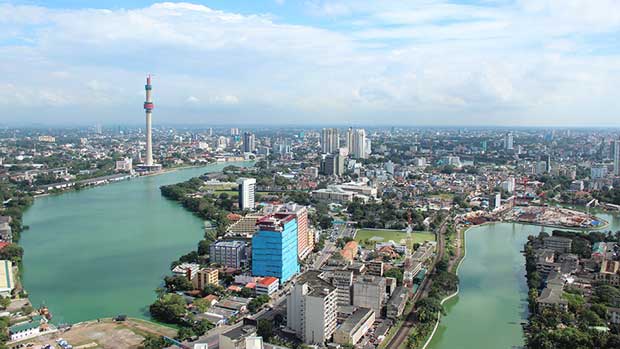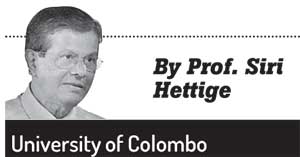Reply To:
Name - Reply Comment
Last Updated : 2024-04-26 05:10:00

Sri Lanka is not the only country that is hit by social and political turmoil today. In fact, almost the entire world is going through a period of unprecedented social and political unrest. Though there can be many explanations of the present state of affairs, based on diverse ideological persuasions, the most empirically valid diagnosis seems to be that it is due to far reaching economic, political, social, ecological and cultural transformations on a global level brought about by globalized capitalism. Take the cases of unprecedented global inequality and political violence.
Business and other opportunities created by globalized capitalism have thrown up hundreds of billionaires across the world, particularly in the old and new zones of global capital such as America, China, India and a few countries in South America. Large parts of the wealth generated by capitalist enterprises are increasingly concentrated in  the hands of individual entrepreneurs, not in social security and insurance funds controlled by states to be used for the benefit of the masses.
the hands of individual entrepreneurs, not in social security and insurance funds controlled by states to be used for the benefit of the masses.
These entrepreneurs, when they are old, may establish their own foundations and become Good Samaritans, distributing charity among the wretched of the earth in Africa and elsewhere. Some of our people can also apply for small grants from such foundations to do various projects!
Then take the case of political violence. As is well known, some of the leading terrorist organizations represent extreme forms of collective identity, and are in general opposed to western liberal values of individual freedom and the pursuit of individual desires. But almost the whole world is today fuelled by consumerism and the pursuit of individual happiness and personal aspirations.
When wealth is not generated in a particular country, many citizens migrate to countries that are prosperous and offer opportunities for modern consumption and peaceful living. It is not easy to reconcile these conflicting tendencies in a world where the states that pursue collective welfare are few and far between.
As we all know, the Sri Lankan State is so indebted to the world and its own citizens that it is forced to sell whatever it can to collect enough money to service accumulated debts and import essentials and not so essentials. How did we come to this point? No serious discussion! Our leaders simply continue to blame each other.
"As we all know, the Sri Lankan State is so indebted to the world and its own citizens that it is forced to sell whatever it can to collect enough money to service accumulated debts and import essentials and not so essentials"
What is the key issue that needs wide public discussion in this country today? It can also be presented as a question: how to reconcile between individual desire and collective interest. In a country where we have vigorously pursued individual interests in almost all spheres for several decades now, i.e. politics, business, public service, diplomacy, professions like law and medicine, academe, civil society, etc, it would be hard for all of us to become selfless overnight and work towards collective welfare, particularly when the State has become too weak under the increasing weight of vested interests to take care of even mundane things like transport and health.
On the other hand, if all of us in our diverse fields work hard to undermine the larger purpose of our institutions, established and maintained at public expense, internecine warfare and random violence will soon create conditions that would make our lives not worth living. But do we see such reflections among our people today? Where is social and moral consciousness in politics, business, law, academe, public service, diplomacy, etc.?
Top public servants sell car permits given to them at public expense in the open market for millions and the dealers sell them to corporate leaders to imports SUV’s. Can we think of a few politicians who strive to rise above petty party divisions and raise the issue of the larger purpose of politics? We are unable to find many such people any more. The same applies to other fields as well.
The failure of the state in many parts of the world due to diverse circumstances is at the core of the present social and other crises. Neo-liberal economic dogma pervaded almost all spheres of human activity and the main casualty has been public welfare. Corruption that has infected many governments has brought down standards of public morality to a very low level in many countries. Yet, some countries have been able to respond decisively and contain the scourge but many others have failed. Singapore and Hong Kong are two shining examples for the former but countries like Sri Lanka have been steadily sinking to the bottom from the late 1970’s onwards, but more particularly over the last decade.
The nexus between politics and business that serves mutual economic interests has been a serious issue in this regard and has impacted on public welfare in many ways. The rapid decline in public spaces in urban areas due to haphazard construction activities is an important issue that needs careful and in depth analysis. Meanwhile, people concentrated in large urban centres are suffocating due to dwindling green spaces and toxic emissions from private vehicles.
The rapid expansion of private transport at the expense of public transport not only threatens public health but also slows down mobility of people, including emergency vehicles that transport seriously ill people and fire fighters.
"Top public servants sell car permits given to them at public expense in the open market for millions and the dealers sell them to corporate leaders to imports SUV’s"
The role of the state in development and public welfare has declined in many countries in recent years. In Sri Lanka, following economic liberalization, the private sector was recognized as the engine of economic growth. The state continued to facilitate the work of the private sector by providing the necessary policy and institutional support.
It is the growing links between the private sector and the government that often created opportunities for some politicians at different levels to engage in corrupt practices and amass wealth. Award of government contracts and issuing of permits and approvals have often been the main avenues of rent seeking activities.
Not all universities around the world function as centres of advanced research and other forms of intellectual activity. Forced to generate revenue to meet much of their expenses, even many leading universities have tended to concentrate on fee levying courses and advertise such courses both at home and abroad to mobilize as many students as possible. Attractive packages are also offered to take professors and lecturers from other universities often resulting in cut throat competition.
Countries that do well economically send their students overseas to study at well- known universities. Local companies in host countries recruit highly competent graduates leaving such universities. America’s Silicon Valley is a case in point. Of course, many other companies do the same. The resulting brain drain often cripples institutions in the developing world. This is where we are today in this country. Not only that our universities have lost many qualified academics and researchers, we have also lost many competent youths to other countries. Meanwhile, our universities attract very few students from overseas.
Sri Lanka’s civil service and later SL administrative service attracted the best university graduates. Some of the British civil servants during the colonial period maintained high standards and became even role models for native officers to emulate.
Some excelled in many fields such as history, archaeology, literature and anthropology. Few native recruits followed their footsteps but that tradition has already died out. In more recent years, many public servants became servants, but not to the public, but to their political masters. Yet, public service remains attractive due to various privileges offered to officers at public expense.
"Sri Lanka’s civil service and later SL administrative service attracted the best university graduates"

Add comment
Comments will be edited (grammar, spelling and slang) and authorized at the discretion of Daily Mirror online. The website also has the right not to publish selected comments.
Reply To:
Name - Reply Comment
US authorities are currently reviewing the manifest of every cargo aboard MV
On March 26, a couple arriving from Thailand was arrested with 88 live animal
According to villagers from Naula-Moragolla out of 105 families 80 can afford
Is the situation in Sri Lanka so grim that locals harbour hope that they coul